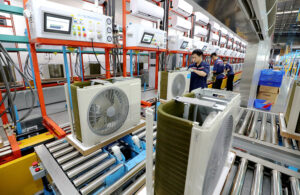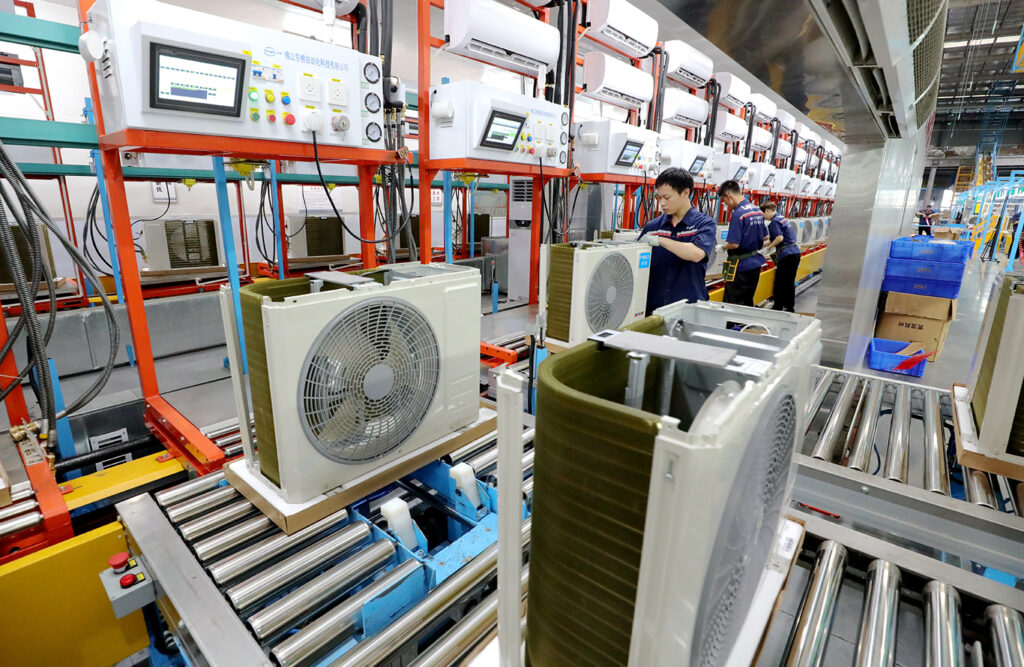- The market for sustainable cooling systems in developing economies is set to hit $600 billion by 2050. Research shows that sustainable cooling systems can cut cooling-related emissions by almost 50%.
- They can also help lower electricity bills, reduce equipment costs, and power sector investments by $8 trillion by 2050.
- Unlocking finance, in particular private finance, is essential to support the transition to sustainable cooling across developing economies.
Economies in Africa are projected to experience the fastest growth in cooling systems, a new survey by the International Finance Corporation and the UN Environment Programme (UNEP)-led Cool Coalition shows.
Globally, Africa is poised to see her cooling systems industry expand by a factor of seven closely followed by countries in South Asia which will see this market segment quadruple.
“The sustainable cooling market represents at least a 600-billion-dollar opportunity for the private sector, which could generate more than 8 trillion dollars in benefits for developing countries,” said Makhtar Diop, IFC’s Managing Director.
“These nations are especially vulnerable to the deadly effects of rising temperatures and are urgently in need of cooling solutions. We are proud to present this report which describes the opportunity to invest in sustainable, affordable, and scalable cooling solutions, aiming for near-zero emissions by 2050.”
Cooling systems market growth projections
The UNEP-led Cool Coalition is a broad network that brings together governments, cities, international organizations, businesses, finance, academia, and civil society groups to facilitate knowledge exchange, advocacy, and joint action towards global transition to sustainable cooling. Currently, the Cool Coalition is working with over 130 partners, including 23 countries.
IFC and UNEP note that cooling systems market in developing economies is expected to grow from the current $300 billion to at least $600 billion, per year by 2050.
The study, which was released during the 79th UN global meeting in New York calls on economies and policymakers to prioritise the use of passive, energy-efficient, environmentally friendly, and economically viable cooling solutions.
The Cooler Finance: Mobilizing Investment for the Developing World’s Sustainable Cooling Needs report notes that developing economies, which generate roughly two-thirds of global cooling-related emissions, are set to double their cooling demand by 2050.
According to the researchers, this rise in cooling systems demand is attributable to a rise in population, expansion of economies, and increased urbanization, scenarios which are unravelling across Africa at breakneck speed.
The report finds that sustainable cooling systems technologies can help lower cooling-related emissions by almost half in 2050 in developing economies. However, to realise these benefits, economies are advised to consider deploying passive cooling strategies such as insulation in energy systems.
Other tips that will be vital are rolling out the use of reflective materials, enhancing green areas, while also adopting the use of energy-efficient technologies at scale.
Enforcing minimum energy performance standards
Additionally, countries and industries are advised to move with speed in enforcing minimum energy performance standards to realise lower cooling-related emissions. What’s more, the report notes that there is need to adopt and design fresh building energy codes.
A faster phase down of climate warming refrigerants will also be beneficial to economies seeking to meet lower cooling systems related emission goals.
For value chains across industries, a systems approach to cold chains and large cooling infrastructure services will be essential to realise these benefits. The report recommends the use of incentives to promote innovation as a way of accelerating the pace of this process.
The report highlights the need for significant upfront investments. Closing existing shortfalls in access to cooling systems for households and SMEs in developing countries will require roughly $400-800 billion, in addition to future increases in demand.
“As record temperatures continue to be broken across the world, keeping cool is an essential need for both healthy communities and a healthy environment. However, we must avoid creating a vicious cycle of meeting cooling demands through solutions that further heat up the planet,” said Inger Andersen, Executive Director of UNEP.
“We need sustainable, affordable and energy efficient cooling solutions that both meet growing demand and support climate, health, food security, and economic development. Governments, private businesses, and multilateral banks can use this report to harness a wide range of financial instruments for sustainable cooling and resilience to extreme heat.”
Other key recommendations according to the report will include the collection and collation of quality data on cooling systems. Capital costs, and financing will equally be essential in realising the benefits of lesser cooling systems related emissions.
Increased seed and high-risk funding
Further, raising awareness, expanding use of best practice business models and financing tools will be vital in this journey. At the same time, the report calls for initiatives that will drive increasing seed and high-risk funding for pilot technologies across the world.
Also welcome in this journey will be strategies to enhance leveraging blended and concessional finance; and building on the Global Cooling Pledge to create a Sustainable Cooling Finance Partnership.
The transition to sustainable cooling systems requires an enabling environment to make developing economies more attractive to investors. UNEP and IFC said they committed to working with governments, businesses, and other stakeholders to de-risk investments and ensure sustainable cooling solutions are accessible to all, especially in low-income regions most prone to increasingly common heatwaves.
Read also: Can Africa’s fragmented voice find unity at COP29 climate finance talks?

